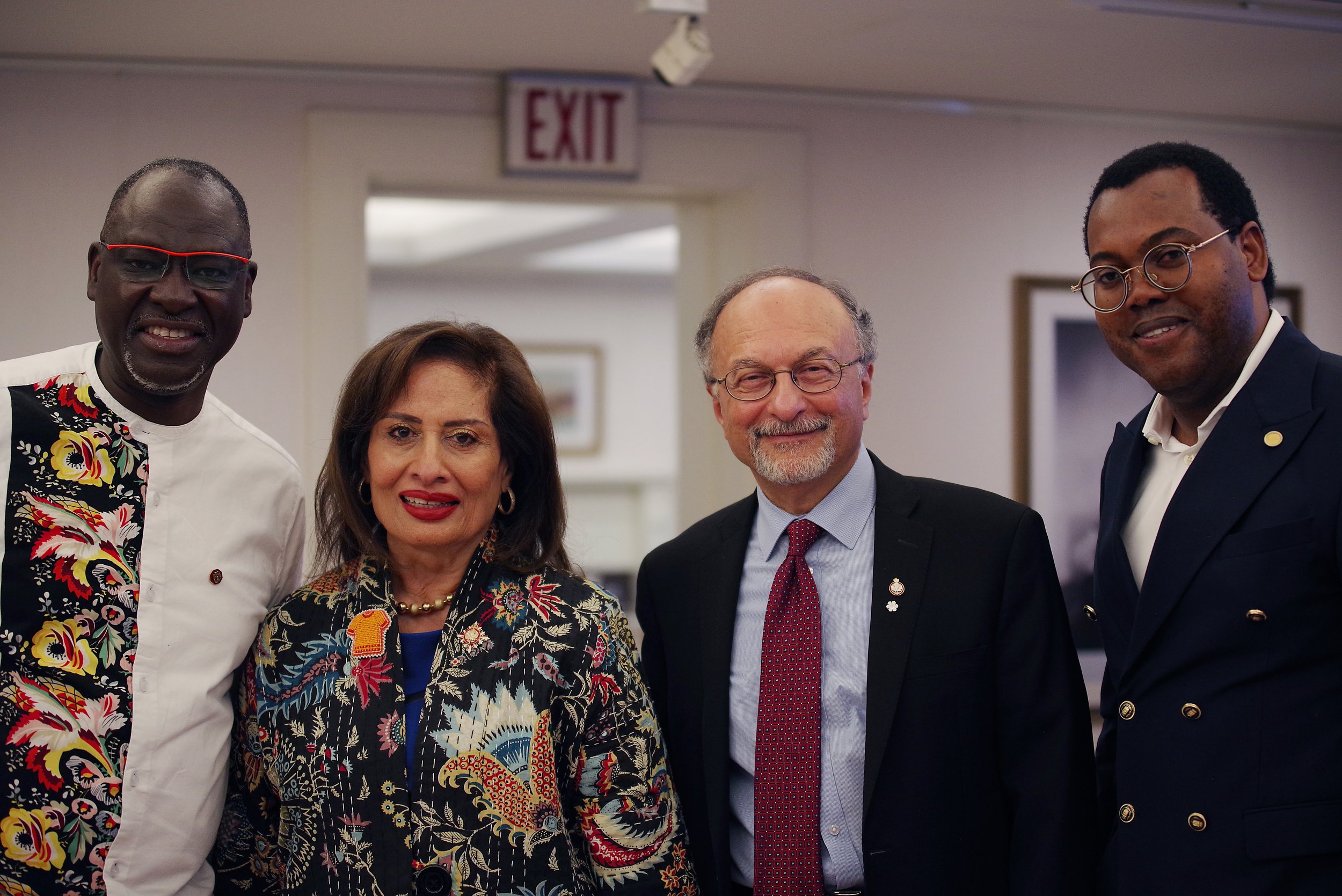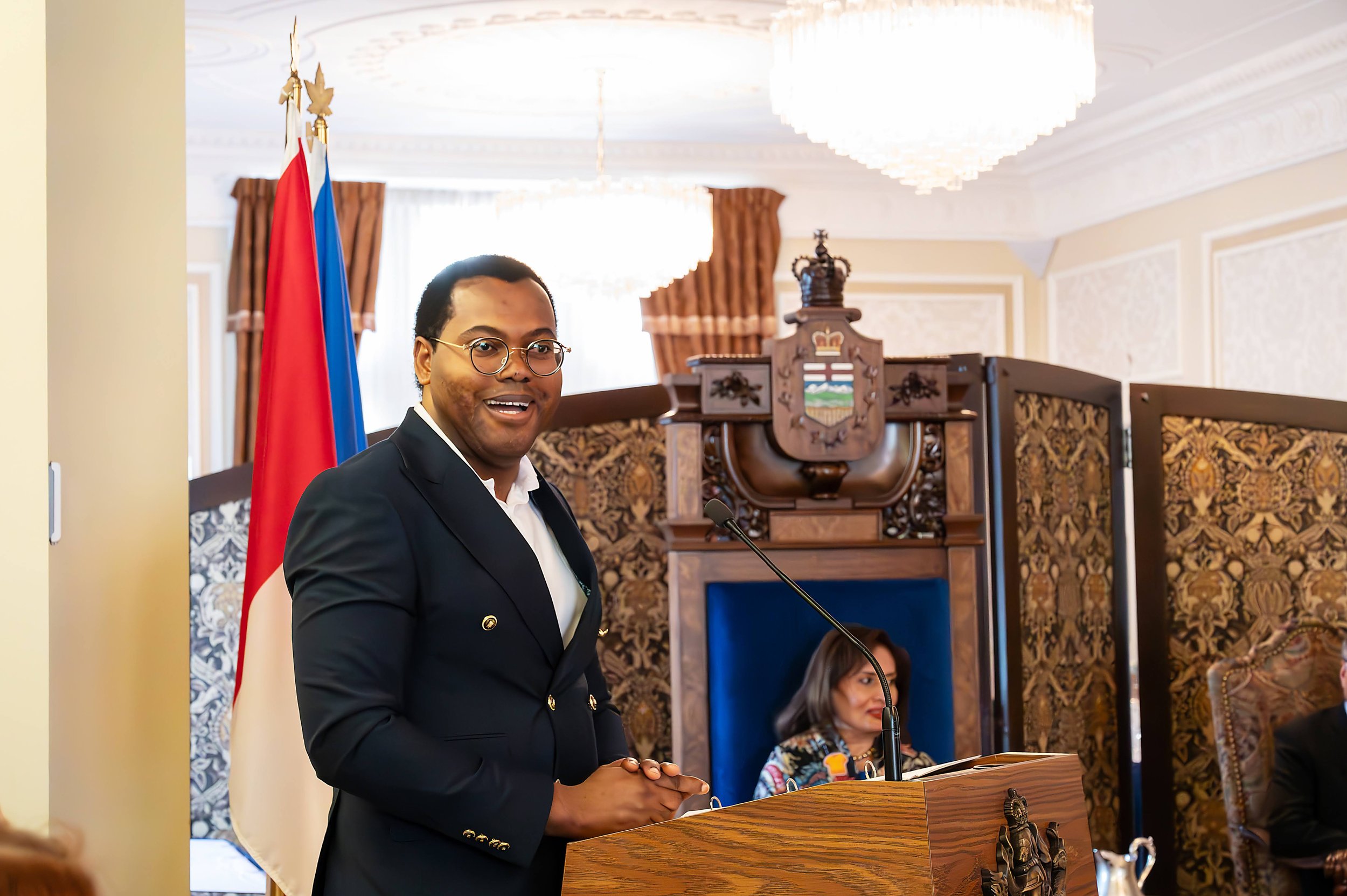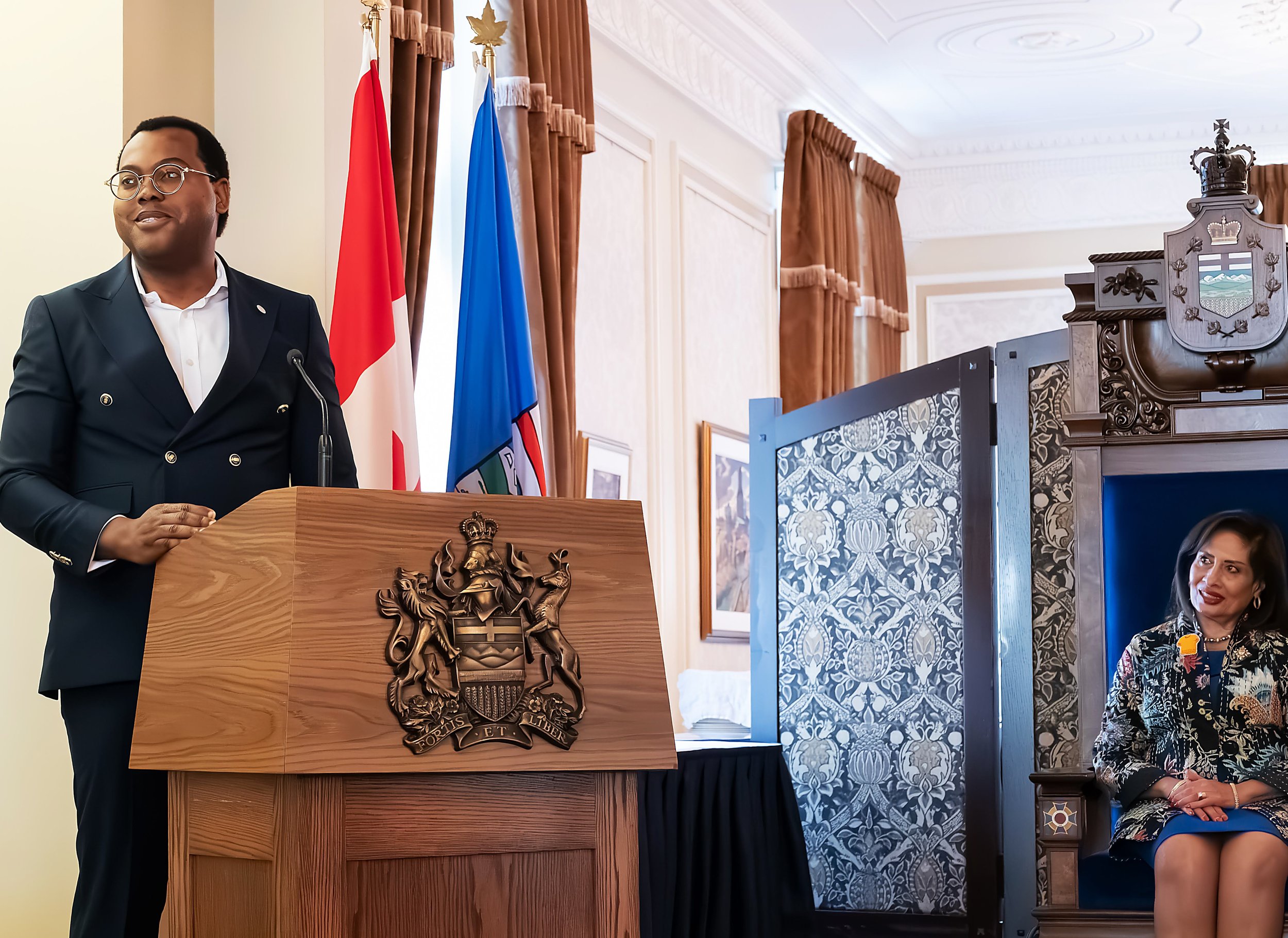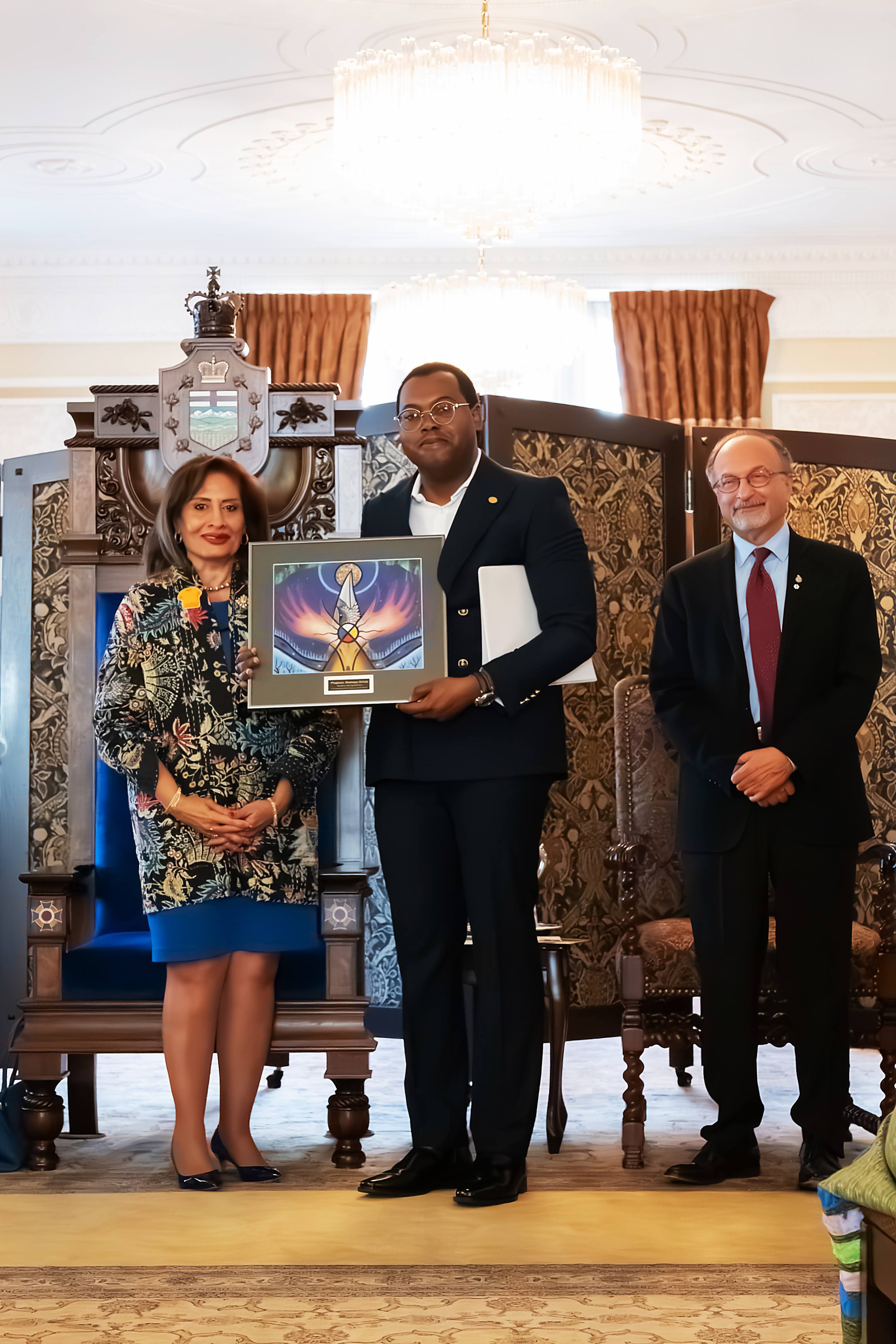On the cusp of history: The Fight for Dignity and Human Rights
Prof. Temitope Oriola is a professor of criminology/sociology and associate dean in the Faculty of Arts, University of Alberta. He is a scholar and public intellectual known for field-defining sociological research on terrorism and policing, leadership and service to his discipline, and commitment to mobilizing knowledge in support of informed public debate. Internationally, he is well-known for his research on terrorism. As one of the most sought after public intellectuals on police reform in Canada, Professor Oriola’s scholarship focuses on policing and use of force and the implications for human rights.
We invite the public to attend Prof. Temitope Oriola’s session at Ignite Change Global Convention on Saturday, December 02, 2023 at 5:00PM MST. Oriola will lead a panel discussion on the topic: The State of Policing: The Search for Justice.
Below is Professor Oriola’s Acceptance Speech for Gerald L. Gall Award at the Human Rights Awards 2023 hosted by the John Humphrey Centre for Peace and Human Rights and Her Honour the Lieutenant Governor Salma Lakhani on September 21, 2023.
On the Cusp of History: The Fight for Dignity and Human Rights
Gerald L. Gall Award Human Rights Award Acceptance Speech
Prof. Temitope Oriola
September 21, 2023
Thank you for the wonderful introduction. I would like to start by thanking the Selection Committee, the Board of Directors and Renée Vaugeois, the Executive Director of John Humphrey Centre for Peace and Human Rights. Thanks to all the staff and volunteers of the Centre. Thank you for keeping alive the memory of Gerald L. Gall. Congratulations to my fellow recipients. Thank you to all the families and friends here today. I am delighted and humbled to receive the Gerald L. Gall Award Human Rights Award.
Two caveats before we proceed. First, I am a Canadian of Nigerian origins, a continental African; born and raised in a post-colonial space. That is relevant because it means I am socialized for the greater part to think in terms of socioeconomic status rather than race. Therefore, social agitation or disadvantage based on race is something relatively new to me. Second, I have zero negative experience with the police in Canada. The implication is that my arguments and perspectives as a scholar, citizen and black male are unencumbered by any personal negative experience or grievance.
Of course, I am aware and reflexive of the fact that I am one of the less than 35 full-time tenured or tenure-track Black professors at the University of Alberta out of approximately 2,100 professors. That positionality comes with certain privileges. There are of course the interactional minutiae and inter-subjective micro-sociological dimensions. For example, one US border agent told me a few years back as I went through the fast lane as a NEXUS trusted passenger program member: “Let me guess: you are either a medical doctor or a professor.” I smiled and told him one of his suggestions was accurate but he would likely not survive it if I operated on any part of his body. My left hand is more active than the right although I am in fact right-handed. I imagine such lack of coordination of hands cannot be good for surgery. Similarly, in other social spaces in everyday life, people routinely tell me that I “look like” a pastor. That often sounds like a cruel joke given the condition of my faith. Having noted these two caveats, here we go.
In late 2008, Nicole Neverson (Ryerson University), and Charles Adeyanju (University of Prince Edward Island) and I began to conduct research on use of conducted energy weapons (CEWs), such as Tasers, in Canada. The research was influenced by the televised death of Polish immigrant Robert Dziekański on the floor of the Vancouver International Airport, growing fatalities following deployment of CEWs and overall dearth of Canadian literature. My colleagues and I warned against the seemingly deteriorating relationship between the police and the socially marginal, particularly within city spaces, the amphitheater of socio-political contestation. We problematized the gaze of law enforcement on poor, mentally challenged, racialized individuals rendered concurrently visible and invisible by law enforcement. We argued that it was time to focus on the economy of violence that the downtrodden faced in socially devalued city spaces. We also articulated the factors influencing public outcry over excessive use of force and support for deployment of CEWs. Recent events have buttressed the salience of our findings. I have argued in the aftermath of Floyd’s death that reforming the police is an explicitly political matter — police organizations rarely change from within.
Analyses from a CBC database on use of deadly force by police from 2000 to June 2020 demonstrated that 16 percent of those killed by police are Indigenous, while Black people comprise 8.63 percent of victims (Singh 2020). These numbers are alarming given that Indigenous people and Black people constitute 5 percent and 4.3 percent of the Canadian population, respectively. The report notes that 2020 has “already been a particularly deadly year in terms of people killed in encounters with police in Canada” (Singh 2020).
We do not have to accept this state of affairs as given, natural or inevitable. My point is that we must all work to fight for human rights. Discourses on terms such as “social justice”, “deconstruction”, “intersectionality” and “social inequality”, among others must go beyond the phraseology of the academic, NGO or political trade. For example, the lack of charges against the officer who kicked Pacey Dumas in the head against the recommendation of ASIRT, should deeply concern us all.
Talcott Parsons, one of the major figures in the discipline of sociology, understood the significance of individual actions in his general theory of action systems. Parsons argued, “a social system is only one of three aspects of the structuring of a completely concrete system of social action. The other two are the personality systems of the individual actors and the cultural system, which is built into their action. Each of the three must be considered to be an independent focus of the organization of the elements of the action system in the sense that no one of them is theoretically reducible to terms of one or a combination of the other two” (1951, pp. 6).
My point is each individual has a role to play despite external constraints. This is not a call for slacktism or hacktivism. Clicking “like” or sharing a post on social media is one thing. What causes you support in real life; how you vote when it matters and your contributions to major and minor decisions in your sphere of influence all go a long way to promote or stifle social justice and human rights.
I have emphasized over the last few years the fact that ASIRT is the second busiest investigative body of its kind in Canada. Only Ontario’s Special Investigations Unit (SIU) is busier. That is fundamentally disproportionate given our population numbers in Alberta. We must not accept those numbers as immutable.
Overall, my approach is one that recognizes the centrality of the role of the police in our daily lives, the fact that police officers deserve our respect and therefore must have a world class working environment. It also means we ought to hold them to world class standards of accountability. Nothing more; nothing less.
I am a strong advocate for police reform. As special adviser to the Government of Alberta on Police Act Review, I provided a number of recommendations that were passed into law through The Police Amendment Act, 2022. Not all of my recommendations made it into the amendment.
Some other policy considerations that I have publicly shared include:
A Police College Model.
A National police conduct database.
A Three strikes rule regarding abuse of civilians.
Requirement of a university degree as minimum entry qualification
A single independent civilian-led oversight entity in Alberta with police services as supervisees.
50% female share of sworn officers
A Diverse pool of sworn officers, including the leadership
Very few countries can beat Canadians’ kindness and the texture of our institutions. No matter who you are or where you come from, this is a great, great country. We only critique an entity with the capacity to change. Therefore, we critique our institutions precisely because we deeply respect them and know they have the capacity for positive change.
As citizens and professionals of all kinds, we must be conscious of our duty to society. Martin Luther King Jr. puts it best in his autobiography. He states:
“When you are aware that you are a symbol, it causes you to search your soul constantly—to go through this job of self analysis, to see if you live up to the high and noble principles that people surround you with, and to try at all times to keep the gulf between the public self and private self at a minimum” (pp. 105).
In Equality and democracy, Philip Green warns against “a politics of victimization in which there is no sympathy for suffering in general, but only sympathy for the suffering of people who are exactly like oneself” (pp. 201). We need to do more to demonstrate that we care for underprivileged members of society. A new society is possible. I am encouraged by the refusal of young people around the world to fall into familiar silos of tribe and tongue. I am encouraged by fellow Edmontonians and Canadians who daily show kindness to those around them and total strangers without expecting anything in return. I am confident that a new society can emerge from the tumult of the present age. Thank you, John Humphrey Centre. I humbly accept the Gerald L. Gall Human Rights Award. E se pupo. Thank you for listening.
Found this inspiring? Be sure to register for the upcoming Ignite Change Global Human Rights Convention happening December 1-10, 2023, where you can check out the panel discussion led by Professor Oriola on December 2, 2023 at 5:00 PM MST. Visit the Convention website today to register and find out more about our lineup of great sessions and speakers that will be present throughout the 10 days of the Convention: https://www.ignitechangeconvention.ca
Want to learn more about Gerald. L. Gall, the inspiration behind this human rights award?
Check out the blog post we released earlier this year that talks more about one of the founders of the John Humphrey Centre: Remembering Gerald L. Gall — John Humphrey Centre for Peace and Human Rights (jhcentre.org)





